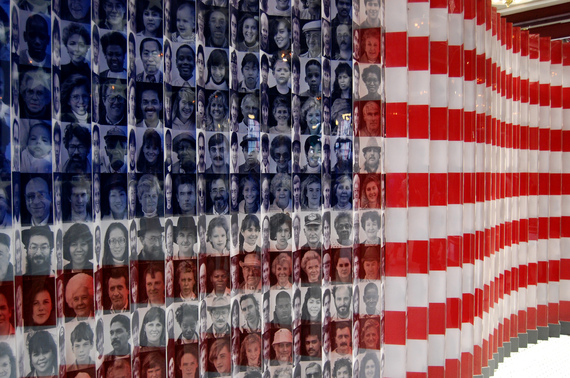America's relationship with racial minorities, religious minorities, and immigrants has ebbed and flowed with time, ranging from acceptance to fear. Since white Europeans first landed in North America the persecution of "the other" ensued and continues today.
Ironically, as Jamelle Bouie noted, the "...United States is a nation that fears immigrants and refugees as much as it is a nation of immigrants and refugees." Such fear is most recently seen in Donald Trump's call for banning Muslim immigration into the United States.
While Islam is religion, and not a race, some scholars feel Islam has been "racialized," since 9/11 with increasing Islamophobia. Faith transcends race and ethnicity; for instance, the rapper Drake identifies as black and Jewish, Dr. Oz identifies as Muslim, and Tej Kaur Khalsa (Russell Brand's Yoga teacher) while white, identifies as Sikh. But recently, "Islam" is being treated as a race and not a faith, emerging from an established tradition of racializing Asian Americans.
When Islam is "racialized," it is the process of as ascribing racial or ethnic identities to those practicing Islam. Such as believing that all Muslims have dark skin, dark hair, speak Arabic, and come from the Middle East. Ultimately, "racialization" emerges from the "in-group" wishing to dominate the "out-group" and having easily identifiable features, whether accurate or not, makes it easier to discriminate against the "out-group." "In America, 'Muslim' as a racial category has acrid meaning beyond religion and now ascribes a racial category," says Neil Gotanda, Professor of Law at Western State College.
Before the ostracization, alienation, and harming of Muslims or those who "look" Muslim becomes more hateful, I call on America to look back at our history and learn from our mistakes. The United States' historical treatment of minorities is shameful, but we can progress and become more loving as a people. Our dark legacy does not have to continue.
Many Americans are familiar with the violent treatment of Native Americans and black populations of America by citizens, laws, and the government, but sadly, many other minorities too have been demonized throughout history.
For instance, in the 1880s, there were deeply negative attitudes towards the Chinese. "Discrimination and violence, often rooted in class conflict as well as racist sympathies, directed at Chinese immigrants already in the United States, particularly in California, fueled passage of the [Chinese Exclusion] law," notes Kevin R. Johnson, Dean of the UC Davis School of Law. "The Supreme Court emphasized national sovereignty as the rationale for not disturbing the laws excluding the 'obnoxious Chinese' from the United States."
This anti-Asian sentiment, which I explored in a previous article, further lead to several other landmark state and national laws which barred Sikhs, Hindus, Japanese and Chinese presence in America from 1913 to 1924, "including immigration restriction, landownership prevention, citizenship denial, wage discrimination, funeral control, and marriage regulations." In California, the California Board of Control submitted a report to Governor Stephens titled 'California and the Orientals' in which they wrote of a perceived economic threat posed by these groups. "These types of statements stirred up anti-Asian feelings among other groups of people, often with dire consequence."
Also in the 1920s, whites were given preferential immigration treatment when Congress established a national origins quota system, "a formulaic device designed to ensure stability in the ethnic composition of the United States," wrote Johnson. One man said, this system was "a scientific plan for keeping America American," implying that those who were not from northern Europe were inferior people.
Jumping 20 years, the era of WWII saw Japanese internment camps where the Supreme Court allowed U.S. citizens of Japanese ancestry, including some born in the United States, to be detained in internment camps. In addition to Asian discrimination, anti-semitism also reared its ugly head and influenced the U.S. Government's refusal to accept many Jewish refugees fleeing the Holocaust.
The list of discrimination goes on. Negative national rhetoric and sentiment leads to unjust legislation which, in turn exacerbates hate directed towards minorities. But, we have seen that after every large discriminatory event in American history, Americans usually regret it deeply and try to rectify it. For example, as recorded by NPR, in 1988 "President Reagan signed the Civil Liberties Act to compensate more than 100,000 people of Japanese descent who were incarcerated in internment camps during World War II." In 2010, The U.S. government apologized "to all Native Peoples for the many instances of violence, maltreatment, and neglect inflicted on Native Peoples by citizens of the United States."
We do not have to continue to institutionalize hate, make mistakes, hurt people and then apologize. We can end the cycle now. We can, as a statement from Congress said, "move toward a brighter future where all the people of this land live reconciled as brothers and sisters, and harmoniously steward and protect this land together." Immigrants, Muslims, brown-skinned people, and those with beards are not to be feared. As FDR said, "The only thing we have to fear is fear itself," and fear comes from a lack of education and personal interaction with those different from oneself.
Individuals can act to counter hateful rhetoric. Donald Trump's statements cause pain and perhaps you can make statements that lead to healing. That's what Greg Worthington did when his social media post calling on people not to discriminate went viral.
A small act of kindness can combat the acts of hate and illustrate to others that there is hope and love in America. National narratives can lead to hate, but they can also lead to love. I urge Americans to spread love. Share your patriotic values and sentiments of freedom, tolerance, and hospitality with everyone who wishes to call America home.
